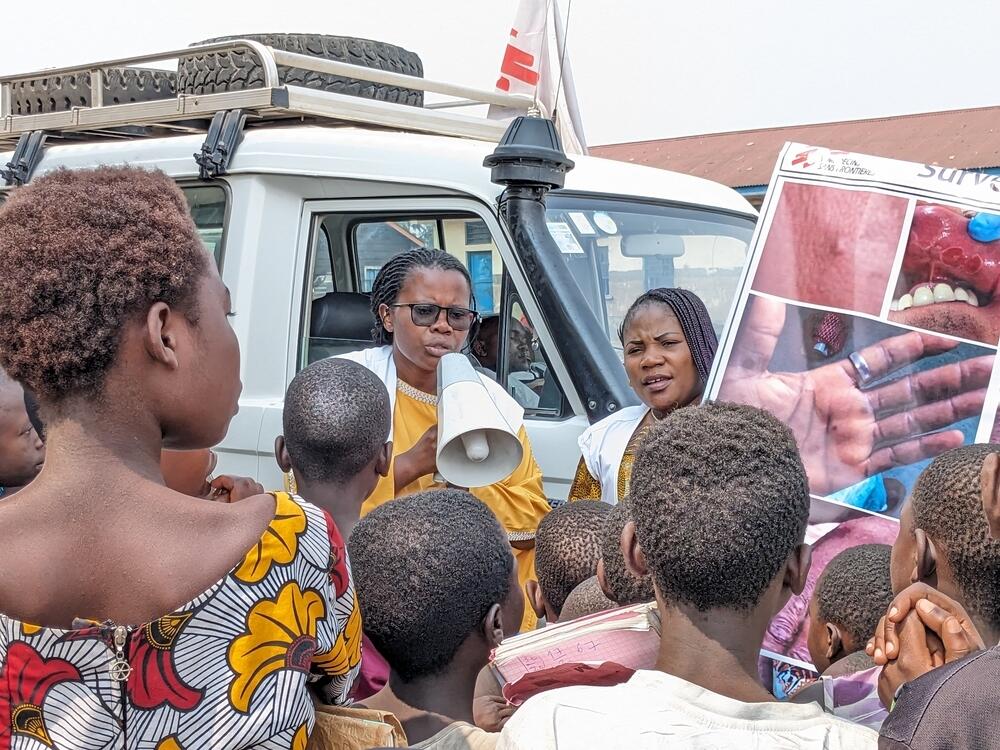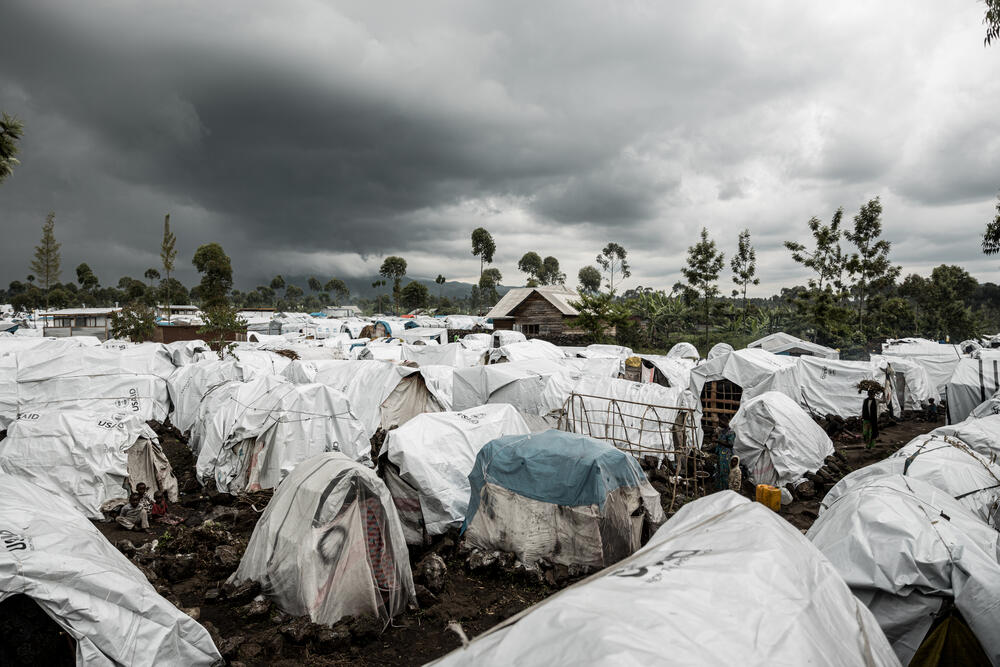Mpox outbreak
Mpox (previously known as monkeypox) is a viral disease usually found in West and Central Africa.
Since the beginning of 2024, there has been a surge in infections driven by a new variant of the virus. This is centred on Democratic Republic of Congo (DRC) with cases also reported in neighbouring countries. On 14 August, the World Health Organization classified the mpox outbreak as a “public health emergency of international concern”.
Médecins Sans Frontières / Doctors Without Borders (MSF) teams are already present in the DRC, where we are treating patients and working to protect at-risk communities.
How can I help MSF respond to the mpox outbreak?
Right now, our teams are treating patients affected by mpox. This is only possible because of donations from people like you.
By giving to our general funds today, you will be helping ensure we can respond to disease outbreaks and emergencies around the world, including in DRC.
Please donate today to support our emergency teams.
Click here to learn more about how we spend your money
What is the mpox outbreak?
Mpox is a virus caused by different strains, each known as 'clades'.
Clade 1 (found in Central Africa) has been circulating in the DRC for years, while Clade 2 (West Africa) was responsible for the global spike in cases in 2022.
However, this new outbreak is due to an offshoot of Clade 1 – identified as Clade 1B – which causes more severe disease and appears to spread more easily. A severe outbreak of mpox emerged in DRC in 2024 with thousands of suspected cases and hundreds of recorded deaths.
How is MSF responding to the mpox outbreak?
In 2024 MSF launched emergency teams to respond to the epidemic across the DRC.
We have responded by:
- Treated thousands of patients in MSF-supported healthcare facilities
- Delivered awareness sessions to support communities to protect themselves
- Followed up cases as part of our contact-tracing work
MSF has been operating in the DRC for decades, delivering healthcare and treating people affected by insecurity, displacement and disease.
Between 2018 and 2020, MSF teams in the DRC responded to a catastrophic Ebola epidemic – the second-worst outbreak in world history.
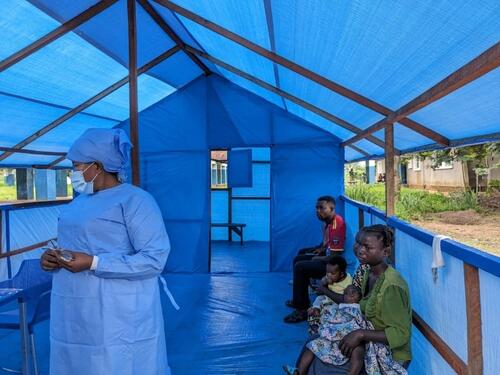
Help us prepare for the next emergency
Questions about mpox
Symptoms of mpox include:
- Painful rashes and swellings
- Fever
- Headache
- Muscle aches
- Back pain
- Exhaustion
The infection can clear up on its own after between 14 and 21 days and most patients recover within a month. However, some people may become very sick, and the disease can be fatal.
The current outbreak is driven by the Clade 1B variant which causes a more severe infection than previous strains.
Mpox can be spread via close contact with an infected person.
The 2022 outbreak (caused by Clade 2) was thought to be spread mostly by sexual contact.
The current outbreak of Clade 1B appears to spread more easily, including via ‘close household contact’. This may involve talking and breathing near an infected person or touching contaminated objects such as bedding, clothing and towels.
Previous spikes in mpox cases have often been related to zoonotic transmission (animal to human), but the latest variant has been spreading via human-to-human transmission in a sustained way for months.
There are already two vaccines for mpox that are approved for use by healthcare authorities.
However, the process for ‘emergency use’ has not been completed. This prevents key organisations such as Gavi – the global vaccine alliance – from distributing the vaccines.
Crucially, there are currently no vaccines available in the DRC. However, negotiations are underway, and priority areas are being identified.
Mpox: Latest news and stories
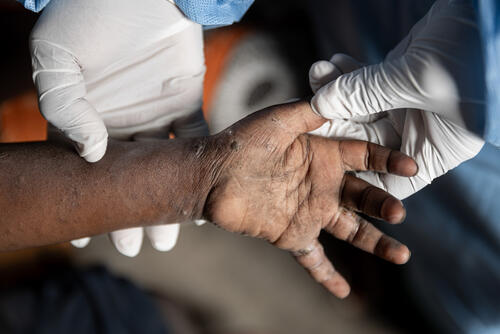
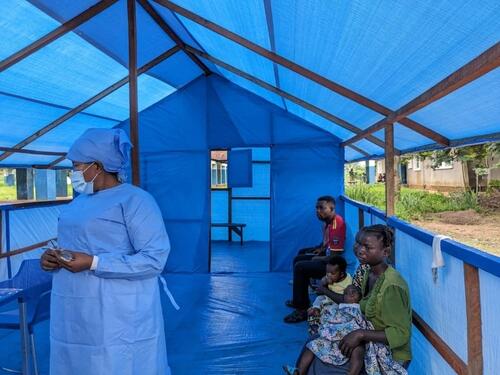
Spotlight: Mpox in displacement camps
Mpox was already endemic to specific parts of the DRC and has caused sporadic outbreaks.
Worryingly, the new epidemic is spreading at an alarming rate and has reached most of the country’s 26 provinces. This includes spikes in the eastern region where communities are already facing a humanitarian crisis.
North Kivu is a province that has long been affected by conflict and insecurity, with over 1.6 million people forced from their homes. As a result, thousands live in extremely crowded displacement camps with poor access to clean water and sanitation, while there are regular mass movements of people.
This creates a very real risk of an explosion in mpox cases.
MSF is concerned that the virus has already been recorded in camps around the city of Goma where more than 600,000 are sheltering in such conditions.
We are calling for the mobilisation of all healthcare organisations involved to protect those most at risk, work with communities and deliver vaccinations where they are needed most.
